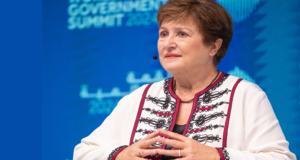 Dubai: Kristalina Georgieva, the Managing Director of the International Monetary Fund (IMF), delivered a stark warning during the World Summit of Governments in Dubai, highlighting a significant revelation from an IMF study: nearly 40% of global employment are vulnerable to the effects of Artificial Intelligence (AI).
Dubai: Kristalina Georgieva, the Managing Director of the International Monetary Fund (IMF), delivered a stark warning during the World Summit of Governments in Dubai, highlighting a significant revelation from an IMF study: nearly 40% of global employment are vulnerable to the effects of Artificial Intelligence (AI).
Georgieva drew a striking analogy, likening the potential impact of AI to a tsunami hitting the labour market, emphasising its scale and importance.
She emphasised the transformative nature of AI, predicting that it could lead to the creation of new jobs, the transformation of existing roles, or even the elimination of certain positions.
“The transition to AI will be akin to the industrial revolution in terms of its impact, affecting 40% of jobs,” said Georgieva.
In terms of preparedness for this technological upheaval, Georgieva outlined four crucial factors: digital infrastructure, skills and labour market mobility, investment in innovation, and regulation and ethics.
While some countries, such as the United Arab Emirates, are primed for the AI revolution, the majority of nations, particularly those in the developing world, are ill-prepared.
The IMF study indicated that approximately half of the jobs susceptible to AI could benefit from its integration, resulting in enhanced productivity. However, for the other half, AI applications may replace tasks currently performed by humans, potentially leading to decreased labour demand, wages, and hiring. In some extreme cases, entire job categories could vanish.
Georgieva highlighted a concerning disparity: many developing nations lack the essential infrastructure or skilled workforce needed to fully leverage the advantages of AI. This raises apprehensions about the possibility of deepening technological inequalities among nations over time.
As the world grapples with the ramifications of AI on the labour market, Georgieva stressed the urgency of proactive measures to ensure inclusive growth and mitigate the risks of widening technological disparities among nations.



